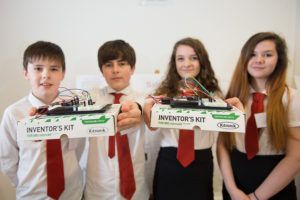Supporting diversity in tech will equal a better future
The following Editorial appeared in The Herald on Sunday on 14 February 2021 as part of their ongoing series and first supplement about the Future of Education.
Following the tech sector’s urgent calls for schools to treat computing science as a core subject, efforts are now underway to tackle the STEM gender disparity and also foster mutually beneficial links between classrooms and leading technology firms. By Andrew Collier
Young people across Scotland are set to benefit from a £75,000 fund to help them learn innovative digital skills and prepare for the jobs and careers of the future.
Grants of up to £5,000 will be available from Digital Xtra Fund, a charity backed by blue chip organisations such as Baillie Gifford and Amazon Web Services, which aims to boost interest in computing and technology in those aged 16 and under through extracurricular activities.
The initiative is particularly aiming to interest female students in the sector and to help address some of the challenges teaching computing and IT.
Last year’s Logan Review into the Scottish technology sector concluded that computing science should be treated as a core school subject in the same way as physics and mathematics.
Kraig Brown, Digital Xtra Fund’s Partnerships and Development Manager, says he is hugely pleased to announce the next round of grant awards, the Fund’s sixth round overall.
“The funding is on a par with the last two years, but I’m delighted with that considering everything that’s happened in the past 12 months,” he adds.

“Each year, we receive more and more applications showing there’s a growing interest for engaging young people in tech through extracurricular activities. The flexibility of these types of activities is ideal for targeting young people from various backgrounds or locations. For example, offering activities in rural areas or attracting female participants often requires something a little different. Extracurricular activities are perfect for this.
“That being said, delivering activities outwith schools over the past year has been extremely difficult. All our 2020 grant recipients had to adapt. However, because of the lockdowns, I hope the tools and knowledge to connect with young people, whatever the situation, are now commonplace when perhaps they weren’t before.
“Just to be safe, we are adding a requirement for this year that all projects must show they can deliver remotely from the outset or that they can pivot if needed. Obviously, that’s very much on the radar just now.”
The deadline for applications is April, with the evaluation process taking place in May and supported initiatives beginning in the new school academic year in August. One new element this year will be the inclusion of at least two grants focused on cyber security skills funded by the Scottish Government under their cyber resilience strategy.
The aim of these grants is to get young people online safely and make them aware of some of the dangers while also providing them with some of the skills they need if they are to follow a pathway in cyber security.
There is a hope that the latest funding round will also bring a particular accent on early years education. “There’s a recognition of the importance of this, and the evidence has shown that it’s both possible and effective”
Another powerful focus will be on building stronger links between industry and education. Kraig explains: “We’ve been very fortunate in building some brilliant relationships. We have CGI, Amazon Web Services (AWS), J.P. Morgan and Baillie Gifford as some of our top contributors. These are all brilliant companies that have been very successful and employ a lot of people in Scotland.
“One of the things they are keen to do as well as providing funding is to improve employee engagement with the projects. I’m a huge fan of this.
 “A recent report by LinkedIn showed that across the UK, the top three emerging jobs are artificial intelligence specialist, data protection officer and robotics engineer. Also in the top 10 were data scientists, cloud engineers and cyber security specialists.
“A recent report by LinkedIn showed that across the UK, the top three emerging jobs are artificial intelligence specialist, data protection officer and robotics engineer. Also in the top 10 were data scientists, cloud engineers and cyber security specialists.
“A young person will likely know that all these are careers in tech, but they probably won’t be able to tell you what they entail.
“That is where engagement with industry is hugely, hugely valuable. It can provide the details and context of these sorts of careers far better than by simply learning technical skills. And it’s not just us saying this: the Scottish Government and other public bodies such as SDS and DYW are too.”
Part of the current problem, Kraig says, is that while these types of careers are highly desired by employers, a lack of understanding about what they actually entail makes them unappealing to young people.
“However, if you can get someone in to talk to them who works in, say, the field of artificial intelligence, and if they can relate to the student and what they are learning, then that type of job suddenly is a lot more interesting and exciting.
“Young people also don’t realise that these jobs are here in Scotland. But if they can gain an understanding of these jobs directly from those who are actually doing them, seeing themselves in a tech career becomes a lot more realistic – and that’s especially true of girls and young women.”
He admits there are issues in bringing industry and educators together in this way. “Schools don’t necessarily know how to get in touch with businesses in their areas and it can be intimidating to call them out of the blue.
“Likewise, it can be difficult to get people from industry involved, especially at peak times. And it can be challenging, for example, to explain AI to a group of 12-year-olds. We need to give industry guidance on how to do that.”

The two sides need to be introduced to each other – “matchmaking”, as he puts it. “That’s definitely something that as a charity, we are looking to do more of. I’d love to bring our industry partners and grant recipients together. At the moment I make introductions, but I’d like to take it to the next level.”
There has been particular enthusiasm for this concept from the IT services firm CGI, he adds. “They want their staff to be involved and to do more with the resources they have. J.P. Morgan are also really interested in this.”
This year’s grant awards will be dedicated to Joan Davidson, the Head of Learning at Edinburgh Science, who sadly passed away last November.
Kraig says: “As I got to know Joan, her passion for STEM education really inspired me – she was my mentor and made the festival’s touring programme in schools very special. You only had to see the children’s faces to see that. Joan was a wonderful person whose work reached more than half a million young people. She really was amazing.”

